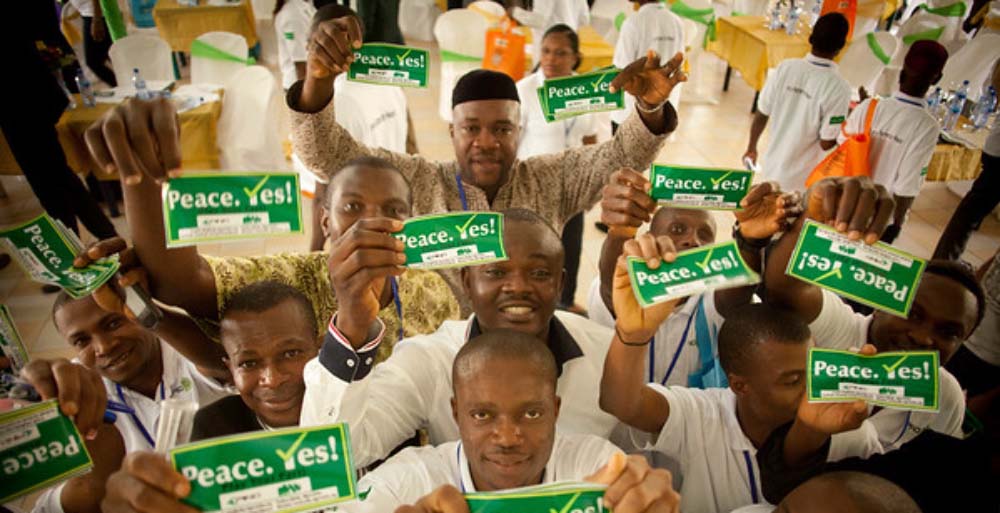Founded in 1940s by missionaries, Baptist High School in Borokiri area of Port Harcourt, Rivers State, was all-boys until 2006 when it turned coeducational. But having girls in the school poses a greater security challenge to the school administrators.
“With all the cult activities, most of the youths will like to come to our school to rape girls, to snatch phones and do all sort of illegalities” says Victor Alasia, vice-principal of the school.
“The students and staff of the school were living in fear”, Alasia says. Borokiri was having a lot of militant activities before the Federal Government offered amnesty to the Niger Delta militants in 2009. Although the scale of violence reduced in the area after the amnesty, the school was still not safe for girls because of wide-spread cult-related violence. Borokori is a densely populated slum with high crime rate.
 Students achieve success and embrace learning when they feel safe. Surrounded in an atmosphere of insecurity, the school turned to Tamunomie Wariboko for succour. Wariboko is a community leader and member of Partnership for Peace (P4P) Network, a volunteer-driven initiative that is reshaping peace in the Niger Delta.
Students achieve success and embrace learning when they feel safe. Surrounded in an atmosphere of insecurity, the school turned to Tamunomie Wariboko for succour. Wariboko is a community leader and member of Partnership for Peace (P4P) Network, a volunteer-driven initiative that is reshaping peace in the Niger Delta.
Wariboko’s peace building activities have made the school safer. “Most at times, we have to call him, and he always come to our rescue,” Alasia adds.
The youth in the community did not allow the school administrators to rebuild a collapsed part of the school fence. They claimed that it would obstruct shops and businesses around the fence.
But the vice-principal of the school believed that the stance of the youths was just a decoy to leave that part of the fence exposed so that they could easily gain entrance into the school to commit crimes. The youths later demanded monetary inducement before thy will allow the reconstruction of the school fence.
Again the school invited Wariboko to intervene and with his involvement the issue was amicably resolved. Eventually, the school did not pay off the youths as initially demanded but rather the youths were engaged to provide labour in rebuilding the fence.
Wariboko is a member of P4P, a network where volunteers gain hands-on skills in peace building and conflict resolution and subsequently become active peace agents in their communities. This unique approach to peace building which started in 2013 with just 120 members has grown into a structured movement for peace across the nine states of the Niger Delta with over 7, 000 members.
Over the past three years, members of the P4P network have identified and resolved over 150 high profile conflicts in the Niger Delta region, including cult-related violence, communal leadership tussles, domestic violence, inter-communal violence, farmers/herders clashes, and election-related violence.
The peace building initiative is a project of the Foundation for Partnership Initiatives in the Niger Delta (PIND), a non-profit organization set up with grants from Chevron Corporation. The mandate of the Foundation is not just to promote peace in the region but also to engage in various empowerment activities that will bring about development in the region.
“I make sure I bring in peace because of the area we live in,” says Wariboko who joined the P4P network in 2016. “This is Port Harcourt town where you see many characters. You see the retired militants and the current militants. So I use the little power I have to maintain peace in my community.’’
Wariboko grew up in Igbaisikikala-Ama in Borokiri where he was once a youth chairman and member of vigilante group. His passion for peace and high sense of justice prompted him to start volunteering to keep peace in his community.
“Right from primary and secondary schools, I don’t like oppression. Right from when I was in secondary school, I used to prevent rape in my community. That was how I started volunteering,’’ Wariboko says.
The P4P network was designed for people like Wariboko who have passion for peace; yet, lack the skills and support to strengthen their peace building roles in their communities. The Network is meant to harness the effort of these peace actors in the region by bringing them into organised platform where they can be trained to play greater peace building roles in their communities.
The concept of the P4P network is that when patterns and trends of conflict risk factors are connected with training and capacity building for response, a positive impact can be made for peace and security in communities.
Wariboko says the first time he attended P4P meeting, a training was conducted for the members. “Some set of people that went for a training were doing step-down training for others. That is the way they organized things. When some people go for training, they will come and step it down to the house during a general meeting.
“They were telling us how to handle issues. That is, how to recognise conflict early warning signs before an issue becomes a conflict. I like the way they handle issues. It is different from the way we do it in our community. I said okay, I need to join this network.’’
Since becoming a member of the P4P network, Wariboko says, he has gained skills on conflict early warning signs, conflict analysis, mediation, negotiation and communication which have enabled him to become effective peace builder in his community.
His peace building activities have gained currency in the community and he is widely appreciated by the community members. Mr. Tony Oba, secretary of Tarikoro-Polo community in Igbaisikikala-Ama applauds Wariboko’s for his selfless service in promoting peace.
‘‘As a community leader, he [Wariboko] told me it is not always good to confront the youths or by bringing in security agents,” Oba says. “In one occasion he gathered the youths for discussion. He talked sense into their heads that the area is becoming too volatile, that they should discard such behaviours and find something meaningful to do. I witnessed the occasion.”
But Wariboko had not always adopted this disposition to peace building until he joined the P4P network. ‘‘Before, the way we handle issues, we do all our things with just power,” he says. “But when I started going for the P4P meetings, I understand we must come to dialogue. So we don’t do it the way used to do it – like power-to-power way. We don’t do that it that way again. Now we call them and ask them what happened, and see how we can settle the issue.”
He says he uses football to engage youths in his community and seizes the opportunity to promote peaceful livelihood. “After the competition, I will gather them and tell them to stop fighting one another and that they are brothers.’’
The P4P network has chapters in all the nine states in the Niger Delta. Each chapter has the component of peace monitors and prevent team who act as the conflict monitoring and rapid response operational arms of the network.




